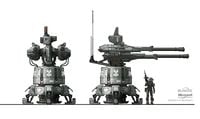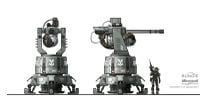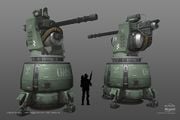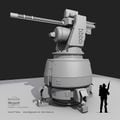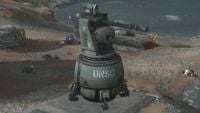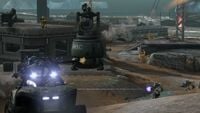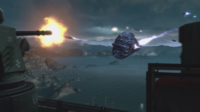M71 Scythe
From Halopedia, the Halo wiki
| M71 Anti-Aircraft Gun | |
|---|---|
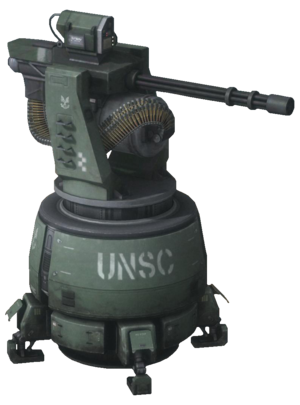
| |
| Production overview | |
|
Manufacturer: |
|
|
Model series: |
Scythe anti-aircraft cannons |
|
Type: |
Automated rotary cannon turret |
| Specifications | |
|
Length: |
|
|
Width: |
6.1 meters (20 ft)[2] |
|
Height: |
|
|
Weight: |
10 metric tons (9.8 LT; 11 ST)[2] |
|
Ammunition type: |
M175 20x102mm high-explosive incendiary/armor piercing ammunition[2][3] |
|
Feed system: |
Belt-fed drum consisting of 100,000 rounds[1] or 1,000 rounds[4] |
|
Pneumatically powered, air-cooled rotary cannon[1] | |
|
6,000 rounds per minute[1] | |
|
Effective range: |
2,000 meters (6,600 ft)[5] |
| Service history | |
|
In service: |
|
The M71 Anti-Aircraft Gun is a self-targeting anti-aircraft weapon manufactured by Misriah Armory and utilised by the United Nations Space Command.[1] It is one of two major production variants in the Scythe line of air defenses alongside the M85 design mounted on human starships.[2]
Overview[edit]
Design details[edit]
The M71 Scythe consists of a pneumatically powered, air-cooled anti-aircraft rotary cannon mounted inside a rotating turret mechanism, typically situated atop a modular tetrapodal mount (also compatible with the M95 Lance guided missile system). The Scythe's main rotary weapon is a six-barrelled cannon designed to fire M175[2] 20x102mm high-explosive incendiary/armor piercing cartridge from a 100,000-round drum with a rate of fire around 6,000 rounds per minute.[1] Some Scythe models may instead use a lower 1,000-round drum and consequently maintain lower rates of fire.[4]
The M71's tetrapodal base allows the emplacement to be deployed on varied types of terrain. When deployed, they can be pre-programmed with a set field of view and use an automated tracking system (usually linked to full-range sensors, relay triggers or even defense-control non-volitional artificial intelligences) to sweep the sky for hostile targets and shoot them down.[1][2] The weapon's control panel is located on the body of the platform; this panel allows an operator to activate or deactivate the weapon, as well as to modify targeting parameters.[4]
The Scythe's high rate of fire allows the Scythe to strip away the armor of Covenant aircraft with relative ease, especially when flying at low altitudes.[1][4] The Scythe can even quickly disable the shields of low-flying aircraft such as the Seraph fighter.[6] Scythe emplacements are also armed with an M41 rocket launcher to complement the main cannon.[4]
Unlike its larger M85 cousin, the M71 Scythe is predominantly designed for terrestrial usage inside an atmosphere. As such, it cannot be used in space warfare mounted on UNSC starships.[7] This role is instead the domain of the M85 Scythe and other forms of point-defense gun.
Operational history[edit]
Scythe turrets were introduced into UNSC service in 2406.[2] They proceeded to serve in the UNSC for over a century throughout the Insurrection and Human-Covenant War, seeing heavy usage during the Fall of Reach in the war's final year. By this time, Scythes were employed as the primary air defence system around the Office of Naval Intelligence's SWORD and CASTLE Bases on Reach.[8][1] One such turret was located at Airview Base, just outside Sword Base. On July 26, 2552, Catherine-B320 and SPARTAN-B312 of Noble Team were ordered to Airview Base to reactivate this turret, which assisted in repelling the Covenant's raid on the base.[8][1] A few weeks later, a group of M71s was later used to defend the Sabre Program Launch/Research Range on Farkas Lake from Seraphs and Spirits.[6]
In March 2553, it was discovered that the Insurrectionists on Venezia had at least two Scythes protecting New Tyne.[9] In October 2559 M71 Scythes were used by the Viery Militia during Operation: WOLFE.[10]
Trivia[edit]
- In concept art, the weapon was known as the Vulcan, in reference to the M61 Vulcan Gatling gun.[11][12] This weapon is also the source of the M41 Light Anti-Aircraft Gun's nickname.
- The initial design for the turret had four Gatling-style cannons, while the final design only incorporates a single cannon. The weapon's design was inspired by the GAU-8 Avenger cannon mounted on the A-10 Thunderbolt.[13][14]
- Though the M71 is designed to be a rapid-firing rotary cannon, in-game, it possesses a low rate of fire, producing deep "booms", and the barrels do not spin until a burst has been fired. Realistically, the weapon should (like the GAU-8 upon which it was based) fire much faster, the barrels should spin while firing, and the weapon should emit a loud buzzing noise. Halo: The Essential Visual Guide reveals that the inconsistencies between the weapon's appearance and function are errors, and that it actually operates like a traditional Gatling-style rotary cannon; thus, it is likely that the Scythes encountered on ONI: Sword Base maintain low rates of fire to conserve their ammunition (as the only time one is seen, it is firing on a single Phantom).
- In rare instances, the rotating turret can fall from the rest of the weapon and continue to fire at enemy aircraft. When detached, it rolls around and can be pushed with a vehicle.[citation needed]
Gallery[edit]

|
Browse more images in this article's gallery page. |
The M71 Scythe AA turret on the level ONI: Sword Base in Halo: Reach.
Catherine-B320 and SPARTAN-B312 fighting near the Scythe turret at Airview Base.
The M71 Scythe Turret seen in the level Long Night of Solace in Halo: Reach.
List of appearances[edit]
- Halo: Reach (First appearance)
- Halo: Glasslands
- Halo: Ground Command
- Halo: Shadows of Reach
Sources[edit]
- ^ Jump up to: a b c d e f g h i j k l Halo: The Essential Visual Guide, page 166
- ^ Jump up to: a b c d e f g h i j k Halo Encyclopedia (2022 edition), page 182
- ^ Halo Waypoint, The Halo Encyclopedia is Out Today (Retrieved on Mar 19, 2023) [archive]
- ^ Jump up to: a b c d e Halo: Reach, Scythe in-game model
- ^ Halo: Shadows of Reach, chapter 16
- ^ Jump up to: a b Halo: Reach, campaign level Long Night of Solace
- ^ Halo 4: The Essential Visual Guide, page 76
- ^ Jump up to: a b Halo: Reach, campaign level ONI: Sword Base
- ^ Halo: Glasslands, chapter 18
- ^ Halo: Shadows of Reach, chapter 16
- ^ Dan Philips portfolio, Halo Reach Vulcan Turret 1 (Retrieved on Mar 19, 2023) [archive]
- ^ Dan Philips portfolio, Halo Reach Vulcan Turret 2 (Retrieved on Mar 19, 2023) [archive]
- ^ Isaac Hannaford, Big guns (Retrieved on Mar 19, 2023) [archive]
- ^ ArtStation, Assorted Turrets for Halo: REACH (Retrieved on Mar 19, 2023) [archive]
| ||

